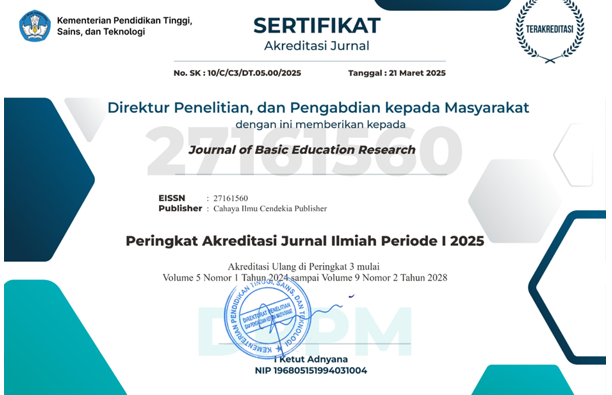The Effect of the Shopee Application on Local Goods Using the Love of the Motherland Character in Class VI Elementary School Students
Abstract
Purpose of this Research: The purpose of this study was to determine the effect of using local goods on the character of the love of the students' homeland.
Research Methods: The research method was conducted at SD Negeri 103/X Sidomukti in class VI. The data collection instruments used were questionnaires and multiple-choice questions. Data analysis used descriptive statistics and inferential statistics.
Main Findings: The distribution of the two questionnaires revealed that the love for the homeland of students needed to be improved. Meanwhile, students' use of local goods is in a wrong category. The regression test results revealed that the use of local goods affected the character of the love for the homeland of students with a sig. 0.034.
Novelty of this Research: The novelty in this study is found in a variable that is different from previous research, namely the character of love for the homeland. The limitation of this research lies in only the social media of the shopee application and the character of love for the homeland. The researcher recommends that there be more research to explore the influence of other social media. As well as more character values, especially in loving the homeland, that needs to be considered, such as tolerance, love for the homeland, peace, and others.
References
M. R. N. Handy, “Menulis dan Mempublikasikan Artikel Akademis,” 2022.
H. Rasyid, “Membangun Generasi Melalui Pendidikan Sebagai Investasi Masa Depan,” J. Pendidik. Anak, vol. 4, no. 1, pp. 565–581, 2015, doi: 10.21831/jpa.v4i1.12345.
Y. Juniarti and Nurlaeni, “Peran Orang Tua Dalam Mengembangkan Kemampuan Bahasa Pada Anak Usia 4-6 Tahun,” J. Pelita PAUD, vol. 2, no. 1, pp. 51–62, 2017.
M. S. Rumetna, T. N. Lina, and A. B. Santoso, “Rancang Bangun Aplikasi Koperasi Simpan Pinjam Menggunakan Metode Research and Development,” Simetris J. Tek. Mesin, Elektro dan Ilmu Komputer., vol. 11, no. 1, pp. 119–128, 2020, doi: 10.24176/simet.v11i1.3731.
E. Y. Nasution, P. Hariani, L. S. Hasibuan, and W. Pradita, “Perkembangan Transaksi Bisnis E-Commerce terhadap Pertumbuhan Ekonomi di Indonesia,” Jesya, vol. 3, no. 2, pp. 506–519, 2020, doi: 10.36778/jesya.v3i2.227.
Y. R. Listiana, “Dampak Globalisasi Terhadap Karakter Peserta Didik dan Kualitas Pendidikan di Indonesia,” J. Pendidik. Tambusai, vol. 5, no. 1, pp. 1544–1550, 2021.
J. Kristiyono, “Budaya Internet: Perkembangan Teknologi Informasi Dan Komunikasi Dalam Mendukung Penggunaan Media Di Masyarakat,” Scriptura, vol. 5, no. 1, pp. 23–30, 2015, doi: 10.9744/scriptura.5.1.23-30.
E. Novianti, A. R. Nugraha, L. Komalasari, K. Komariah, and D. S. Rejeki, “Pemanfaatan Media Sosial dalam Penyebaran Informasi Program Pemerintah (Studi Kasus Sekretariat Daerah Kabupaten Pangandaran),” Al Munir J. Komun. dan Penyiaran Islam, vol. 11, no. 1, pp. 48–59, 2020.
S. Ningsih, “Strategi Membangun Customer Trust Pada Online Shop Dikalangan Mahasiswa Milenial,” Din. J. Islam. Manag, vol. 3, no. 1, pp. 1–9, 2020.
S. Soedewi et al., “Information Architecture Pada Aplikasi E-Commerce ( Studi Komparasi Aplikasi Shopee Dan Tokopedia ),” J. Bhs. Rupa, vol. 05, no. 01, pp. 22–34, 2021.
G. Pratama, “Analisis Transaksi Jual Beli online Melalui Website Marketplace Shopee,” J. Ekon. dan Bisnis Islam J. Ecopreneur Anal, vol. 1, pp. 21–34, 2020.
D. E. B. Jabat and V. Saragih, “Perkembangan Startup Teknologi Pendidikan (EdTech) di Masa Pandemi Covid-19,” SKYLANDSEA Prof. J. Ekon. Bisnis dan Teknol, vol. 1, no. 2, pp. 75–80, 2021.
B. V. Haekal, I. Ernawati, and N. Chamidah, “Klasifikasi Kepuasan Pengguna Layanan Aplikasi Shopee Menggunakan Metode Decision Tree C4.5,” Inform. J. Ilmu Komput, vol. 17, no. 3, p. 188, 2021, doi: 10.52958/iftk.v17i3.3648.
R. W. A. W, M. V. Poluakan, D. Dikayuana, H. Wibowo, and S. T. Raharjo, “Potret Generasi Milenial Pada Era Revolusi Industri 4.0, [Portrait of the Millennial Generation in the Industrial Revolution 4.0],” Focus J. Pekerj. Sos, vol. 2, no. 2, pp. 187–197, 2019.
A. Susanto, “Proses Habituasi Nilai Disiplin Pada Anak Usia Dini Dalam Kerangka Pembentukan Karakter Bangsa,” J. Sosioreligi, vol. 15, no. 1, p. 21, 2017.
D. A. Hakim, “Internalisasi Nilai-Nilai Pendidikan Agama Islam melalui Metode Pembiasaan Siswa Madrasah Ibtidaiyah,” COMSERVA Indones. J. Community Serv. Dev, vol. 1, no. 12, pp. 1231–1251, 2022, doi: 10.36418/comserva.v1i12.197.
L. Fatmawati, R. D. Pratiwi, and V. Y. Erviana, “Pengembangan Modul Pendidikan Multikultural Berbasis Karakter Cinta Tanah Air dan Nasionalis pada Pembelajaran Tematik,” Sch. J. Pendidik. dan Kebud, vol. 8, no. 1, pp. 80–92, 2018, doi: 10.24246/j.js.2018.v8.i1.p80-92.
D. Daud and Y. Triadi, “Implementasi Pendidikan Karakter Cinta Tanah Air Dalam Proses Pembelajaran Di Sekolah Dasar,” J. Eval. Educ, vol. 2, no. 4, pp. 134–139, 2021, doi: 10.37251/jee.v2i4.239.
D. Permatasari and Y. Pratiwi, “Karakteristik Naskah Drama Serial Bertema Cinta Tanah Air Karya Siswa Ektrakulikuler Teater Sman 4 Malang,” J. Pendidik. Bhs. dan Sastra Indones. Met, vol. 6, no. 1, pp. 43–50, 2021, doi: 10.21107/metalingua.v6i1.10504.
C. Pamungkas, “Nasionalisme Masyarakat Di Perbatasan Laut: Studi Kasus Masyarakat Melayu-Karimun,” Lipi, vol. 41, no. 2, pp. 147–162, 2015.
A. B. U. Putri and N. Hasyim, “Upaya Melestarikan Permainan Tradisional Engklek melalui Teknologi,” J. Rupa, vol. 2, no. 2, pp. 77–149, 2017.
A. B. Augustien, “Pengaruh E-Service Quality Terhadap Customer Loyalty Dengan Customer Satisfaction Sebagai Intervening Pada Aplikasi Shopee,” J. Strateg. Pemasar., vol. 7, no. 2, 2020.
Y. F. Rahmandika, L. Puji, and H. Purwanto, “Analisis Pengaruh Harga Dan Kualitas Pelayanan Terhadap Kepuasan Konsumen,” EKOBIS J. Ilmu Manaj. dan Akunt, vol. 8, no. 1, pp. 65–74, 2020, doi: 10.36596/ekobis.v8i1.319.
D. Indrawan and dkk, “Metode Kombinasi/Campuran Bentuk Integrasi Dalam Penelitian,” J. Stud. Guru dan Pembelajaran, vol. 4, no. 3, pp. 735–739, 2021.
Z. Abidin, A. Hudaya, and D. Anjani, “Efektivitas Pembelajaran Jarak Jauh Pada Masa Pandemi Covid-19,” Res. Dev. J. Educ, vol. 1, no. 1, p. 131, 2020, doi: 10.30998/rdje.v1i1.7659.
E. Pujianto and Masrukan, “Analisis Kemampuan Komunikasi Matematis Model Round Club dengan Self Assessment Bernuansa Etnomatematika Berdasarkan Gaya Kognitif,” Unnes J. Math. Educ. Res, vol. 5, no. 1, pp. 81–89, 2016.
E. Sudibyo, B. Jatmiko, and W. Widodo, “Pengembangan Instrumen Motivasi Belajar Fisika: Angket,” J. Penelit. Pendidik. IPA, vol. 1, no. 1, p. 13, 2017, doi: 10.26740/jppipa.v1n1.p13-21.
S. Syamsuryadin and C. F. S. Wahyuniati, “Tingkat Pengetahuan Pelatih Bola Voli Tentang Program Latihan Mental Di Kabupaten Sleman Yogyakarta,” Jorpres (Jurnal Olahraga Prestasi), vol. 13, no. 1, pp. 53–59, 2017, doi: 10.21831/jorpres.v13i1.12884.
M. Linarwati et al., “Studi Deskriptif Pelatihan Dan Pengembangan Sumberdaya Manusia Serta Penggunaan Metode Behavioral Event Interview Dalam Merekrut Karyawan Baru Di Bank Mega Cabang Kudus,” J. Manage, vol. 2, no. 2, pp. 1–8, 2016.
K. Khauro, A. Setiyawan, and T. Citrawati, “Pengaruh Metode Ceramah Terhadap Hasil Belajar dalam Pelajaran Matematika Kelas I SDN Telang 1,” Pros. Nas. Pendidik. LPPM IKIP PGRI Bojonegoro, vol. 1, no. 1, pp. 667–671, 2020.
L. D. Martias, “Statistika Deskriptif Sebagai Kumpulan Informasi,” Fihris J. Ilmu Perpust. dan Inf., vol. 16, no. 1, p. 40, 2021, doi: 10.14421/fhrs.2021.161.40-59.
Maulana, “Statistika dalam Penelitian Pendidikan,” 2016.
U. Hasanah, S. Sarjono, and A. Hariyadi, “Pengaruh Model Problem Based Learning Terhadap Prestasi Belajar IPS SMP Taruna Kedung Adem,” Aksara J. Ilmu Pendidik. Nonform, vol. 7, no. 1, p. 43, 2021, doi: 10.37905/aksara.7.1.43-52.2021.
Marcella, “Pengaruh Application Content Dan Customer Care Terhadap Eloyalty Dengan E-Satisfaction Sebagai Variabel Intervening Pada Konteks E-Commerce Shopee,” Strateg. Pemasar, vol. 06 no.2, 2019.
N. Rahmalia and I. D. Tricahyono, “Analisis Customer Journey Mapping Untuk Meningkatkan Customer Experience Pada Aplikasi Mobile E-Commerce Dengan Menggunakan Metode Diary Study (Studi Pada Aplikasi Mobile E-Commerce Shopee),” e-Proceeding Manag, vol. 7, no. 2, pp. 5226–5239, 2020.
E. Brilianaza and A. Sudrajat, “Gaya Hidup Remaja Shopaholic dalam Trend Belanja Online di Shopee,” JSSH (Jurnal Sains Sos. dan Humaniora), vol. 6, no. 1, p. 45, 2022, doi: 10.30595/jssh.v6i1.12225.
N. H. Syah, “Analisis Faktor-Faktor yang Mempengaruhi Keputusan Pembelian Melalui Online Shop di Kota Medan,” AT-TAWASSUTH J. Ekon. Islam, vol. 6, no. 2, p. 213, 2021, doi: 10.30829/ajei.v6i2.768.
J. Psikologi, F. I. Pendidikan, J. Psikologi, and F. I. Pendidikan, “Studi Fenomenologi : Dampak Aplikasi Tiktok Terhadap Remaja Akhir Shopee Affiliates Nadila Trisukma Devi Yohana Wuri Satwika Abstrak,” J. Penelit. Psikol., 2020.
P. Felita, C. Siahaja, V. Wijaya, G. Melisa, M. Chandra, and R. Dahesihsari, “Pemakaian Media Sosial Dan Self Concept Pada Remaja,” J. Ilm. Psikol. MANASA, vol. 5, no. 1, pp. 30–41, 2016.
T. Rostini, “Konsep Globalisasi Dan Sikap Cinta Tanah Air Melalui Metode Diskusi Pada Mata Pelajaran,” vol. 5, no. September, pp. 157–170, 2018.
R. Palunga and Marzuki, “Peran Guru Dalam Pengembangan Karakter Peserta Didik Di Sekolah Menengah Pertama Negeri 2 Depok Sleman,” pp. 109–123.
D. A. Dewi and Y. R. Listiana, “Pengaruh Globalisasi Terhadap Rasa Cinta Tanah Air Pelajar Di Banyumas,” IJOIS Indones. J. Islam. Stud, vol. 2, no. 01, pp. 25–34, 2021.
A. O. Sitanggang, S. Ds, M. Si, A. E. Syafrina, and M. Si, “Pemanfaatan Media Sosial untuk Promosi Produk di SDN Karang Bahagia 02,” vol. 1, no. 2, pp. 73–86, 2021.
F. Z. Rahmanti et al., “Pengenalan Pemrograman Perangkat Bergerak bagi Siswa SMA/SMK dalam Kegiatan Seminar Ilmiah Populer Online,” J. Pengabdi. Masy. Indones, vol. 2, no. 3, pp. 237–243, 2022, doi: 10.52436/1.jpmi.596.
Copyright (c) 2022 Junaidi Junaidi, Putri Fadillah

This work is licensed under a Creative Commons Attribution-NonCommercial 4.0 International License.
Authors who publish with this journal agree to the following terms:
- Authors retain copyright and acknowledge that the Journal of Basic Education Research is the first publisher licensed under a Creative Commons Attribution 4.0 International License.
- Authors are able to enter into separate, additional contractual arrangements for the non-exclusive distribution of the journal's published version of the work (e.g., post it to an institutional repository or publish it in a book), with an acknowledgment of its initial publication in this journal.
- Authors are permitted and encouraged to post their work online (e.g., in institutional repositories or on their website) prior to and during the submission process, as it can lead to productive exchanges and earlier and greater citation of published work.





.png)


.png)
.png)


















